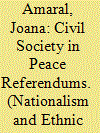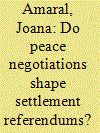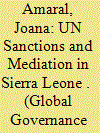| Srl | Item |
| 1 |
ID:
181269


|
|
|
|
|
| Summary/Abstract |
This article asks whether civil society’s inclusion/exclusion in peace negotiations shapes their involvement in peace agreement referendum campaigns. It seeks to answer this question through a qualitative comparative analysis of the Northern Irish Good Friday Agreement and Cypriot Annan Plan experiences. It finds that civil society’s push for inclusion in Northern Ireland and in the Turkish Cypriot community was followed by their greater mobilization in the referendum that strengthened the overall “yes” campaign, while this did not take place in the Greek Cypriot community. Drawing on the literature on European integration referendums, it argues that peace referendums need to be preceded by inclusive negotiations.
|
|
|
|
|
|
|
|
|
|
|
|
|
|
|
|
| 2 |
ID:
160810


|
|
|
|
|
| Summary/Abstract |
Peace negotiations have traditionally aimed at reaching a negotiated settlement between political representatives in conflict settings. However, these settlements have seldom been rejected in referendums. This article uncovers whether the way peace negotiations are conducted influences peace settlement referendum outcomes in order to determine if and how they can better foster public support for peace settlements. It analyses and compares if and how specific characteristics of the Annan Plan and the Good Friday Agreement negotiations influenced the rejection of the former in 2004, and the acceptance of the latter in 1998, in their respective referendums in Cyprus and Northern Ireland. Through the qualitative analysis of elite interviews and documental data, it demonstrates that political inclusivity, civil society engagement and the public exposure of the negotiations shaped the opposing outcomes of the two cases, as well as differences in the support given by the local communities. It argues that peace settlement referendums require less secretive and more inclusive negotiation processes, which can better foster political support and civic mobilisation, and inform and engage the wider communities at earlier stages of the peace process.
|
|
|
|
|
|
|
|
|
|
|
|
|
|
|
|
| 3 |
ID:
185684


|
|
|
|
|
| Summary/Abstract |
The UN-imposed sanctions on Sierra Leone began in 1997 after the Revolutionary United Front (RUF) led a coup that forced newly elected president Ahmad Tejan Kabbah into exile. Alongside its peacemaking efforts, the UN Security Council explicitly supported the reinstatement of Kabbah, and its sanctions targeted the RUF by limiting travel and banning the trade of arms, petroleum, and diamonds. This article analyzes whether and how UN sanctions pushed the RUF to negotiate, accept, and implement agreements mediated by the Economic Community of West African States and the UN. Its findings are drawn from the qualitative analysis of official documents, memoirs, and interviews with key negotiators. It adds to the inclusion debate in peace mediation literature by discussing whether the coordinated use of sanctions and mediation can resolve the difficulties inherent in including veto players in peace negotiations.
|
|
|
|
|
|
|
|
|
|
|
|
|
|
|
|